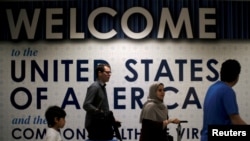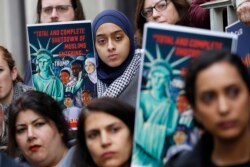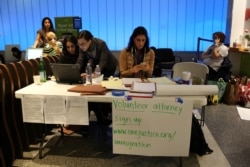Coffee shops in downtown Tripoli, Libya, are closed because of the coronavirus pandemic, so Mohammed Abdulwaheb, 37, got his "to-go" and drank it in the parking lot.
Libya and other countries had been subject to the Trump-era "travel ban" for four years before it was lifted last week. Back then, Abdulwaheb had wanted to attend graduate school in the United States. But that was a long time ago, he said.
"The ban wasn't fair," Abdulwaheb added. "And of course it impacted our lives. The end of the ban will especially improve the lives of Libyans in America."
But experts say it will take time to unravel the regulations that grounded so many travelers. And locals in Libya, Nigeria and Sudan — three impacted countries — say resolving the personal setbacks experienced by individuals may take even longer.
When former president Donald Trump introduced the policy in 2017, critics quickly dubbed it the "Muslim ban" because it initially applied to Muslim-majority countries and came after Trump had promised to close U.S. borders to Muslims. The administration had said the ban was needed to keep the country safe.
But the measure was introduced so abruptly that travelers were left stranded in airports around the world. It separated families and sparked protests at airports across the U.S.
By the time newly inaugurated President Joe Biden declared the ban canceled last week, it applied to 13 countries in various forms. Eritrea, Kyrgyzstan, Myanmar and Nigeria were added to the list in 2020, which by then also included Iran, Libya, Somalia, Syria, Yemen, North Korea and Venezuela. Residents of Sudan and Tanzania were prohibited from immigrating through the U.S. Diversity Visa lottery.
"Hopefully, with the removing of this ban, we will see a lot of change now," said Abdulwaheb in Tripoli. "Hopefully."
Missed chances
Thousands of kilometers south in Abuja, Nigeria, Wole Olaoye, a leading local journalist, was less sanguine about the ban.
His son had already been accepted to a graduate program in California doing research on artificial intelligence when Nigeria was added to the list in early 2020. His son's visa was subsequently rejected.
"I think America needs to make up its mind on whether it wants foreign students or not," said Olaoye in a phone interview on Wednesday. "You cannot allow your universities to go through the motions of requesting transcripts from universities, processing applications for students, taking initial deposits, only for you to say the students are a 'no go.'"
Besides students, the ban kept out potential workers and tourists, and separated families for years, said Sarah Pierce, a policy analyst at the Washington-based Migration Policy Institute.
"Immigration is one of the greatest resources for the United States," she argued. "So the idea that we are just indiscriminately blocking certain populations is a huge loss to the United States. It's a loss of family reunification. It's a loss of potential workers and a lot of other intangible things that we can't quite measure."
But the end of the ban will not necessarily mean a quick solution for hopeful visa applicants, Pierce said. Rejected applications will have to be reviewed or resubmitted, and many people in the affected countries are expected to put in new applications as the coronavirus pandemic subsides and travel becomes safer.
"It will be difficult," she said. "But at the very least it is something that the administration is already looking into it."
Long-term impact
The lifting of the travel ban is a cause for celebration in Sudan, a country that has long suffered from international isolation.
For decades Sudan has not just been on the U.S. travel ban list, but on a list of states the U.S. said sponsored terrorism. In December, Sudan was also removed from the "terror" list.
In a crowded cafe in Gadarib, Mohammed Ahmed, a 38-year-old civil servant, said the lifting of the travel ban is of little significance to many Sudanese who are more concerned about rising prices and increasing insecurity. But after decades of sanctions and travel restrictions, it could mean an increase in investment, development and general prosperity.
"For me the issue is different," Ahmed said. "I can see a long-term impact."








